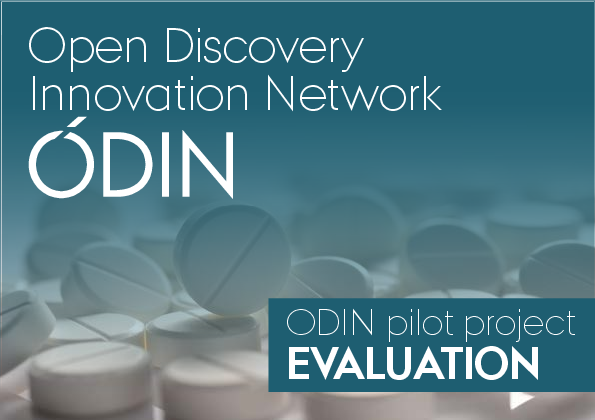READ THE FULL REPORT OR THE SMALL SNAPSHOTS
The ODIN pilot project (2020-2023) has been evaluated by the Danish Centre for Studies in Research and Research Policy.
You can either read the full impact assessment or you just read our BRIEF SUMMARY here:
- ODIN is a novel and promising approach to promoting university-industry collaborations. The pilot engaged more than 100 academic group leaders and more than 40 companies. This resulted in a total of 11 funded projects.
- Academic participants highlight that the projects are inspired by industry needs and challenges. But they also highlight that they are still free to be curious and follow new leads when something exciting turns up in their projects.
- Industry participants expect that ODIN projects will lead to significant new innovative steps in drug discovery and development. Some even explain that they believe the projects will create a lot of value for both university and industry, and none of them would be able to do it alone.
Below are some cartoons and short texts that explain the main findings.
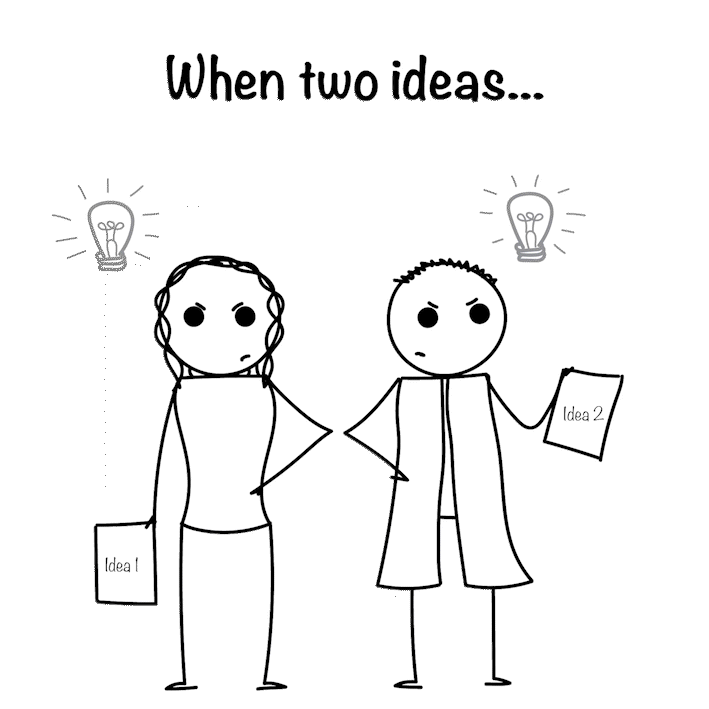
ODIN IDEATION
Co-created research projects are more relevant for both academia and industry.
That sounds obvious, doesn’t it? But try to think about it. How often are research projects really co-created? In general, not too often.
With ODIN projects, it’s different. Each of the 11 projects in our pilot were co-created by industry and academia. This makes the projects more relevant, because:
- The projects are informed and inspired by needs and unsolved challenges in industry – thus the practical relevance is stronger.
- The industrial and scientific aims are more aligned.
Academic participants describe how the projects become more relevant because the participants have an ongoing dialogue:
“Normally, we [my group] do applied research and all of that research could be useful for several people. But, in the end, it might not be, because I don't get to hear from the companies whatever it is that they really need, because they don't want to tell me their secrets. So, for me a key difference in ODIN is the chance talk to each other…”
So, let’s keep projects relevant by talking to each other!
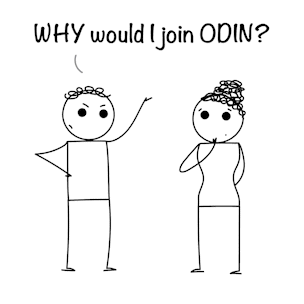
ODIN FROM AN INDUSTRIAL POINT OF VIEW
Industry partners think it makes sense to participate in ODIN. Here are 3 reasons why:
- ACADEMIC COLLABORATION: Industry can expand their academic network – and at the same time they can stay up to date with state-of-the-art methods and ideas.
- CHALLENGES: Industry gets help solving some of their research challenges because all projects are inspired by industry needs.
- HIGH-RISK, HIGH-GAIN: The projects are high-risk, high-gain projects that the companies would not fully fund themselves. ODIN financially supoprts the risk-taking, while partners gain tacit knowledge throughout the project. Projects also may lead to new findings that are important to many different stakeholders.
We think these are three very good reasons to join ODIN. So do the many companies participating in our projects. As one of our industrial board members says:
“Seeking out exciting new knowledge where it is, and where it’s generated, and to maybe be among the first to gain insight into it… Well, that’s how we can be competitive.”
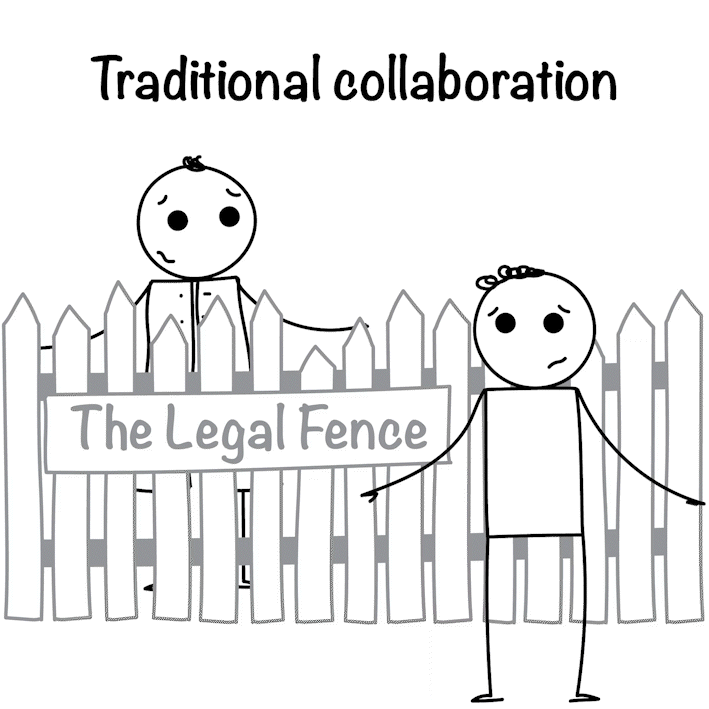
THE LEGAL FRAMEWORK
“We actually think it’s pretty awesome to approach the legal stuff this way”
That’s a quote from one of our industrial board members. And of course we agree!
In fact, we think there are several good reasons for collaborating openly with standard legal agreements in early-stage projects such as the ones we have in ODIN.
According to our assessment, there are two main advantages to ODIN’s legal framework:
1. IT’S FAST – THERE’S NO FIGHTING OVER LEGAL STUFF
There are no negotiations about contracts and IP. All parties in ODIN must accept our standard legal agreement. Therefore, it’s a ‘quick fix’ to start ODIN projects: If all parties are keen on the collaboration, it’s simply ‘sign-and-go’.
One of our board members explain that this is not always how it goes in traditional collaborations:
”So, you have this dilemma where you have some scientists on both sides of the fence who really want to work together on some-thing exciting […] and then everything ends up in a knot because you fight over all this legal stuff.”
2. IT’S LESS COMPLICATED
If you take IP out of the collaboration equation, the fundamental premises for the collaborations have improved significantly. In ODIN, background IP remains 'owned' by the respective parties, but newly created precompetitive research insights will be shared openly over the course of the project.
”It has definitely made it much, much easier to collaborate. Not just to get the contracts in place, but the whole thing about having as a fundamental premise for the collaboration that there is no IP to fight over.” says the same board member.
In ODIN, we are very happy that all the hard work has paid off. A large group of academic and industrial legal officers have created a legal framework, which all participants have agreed to. That’s something to be proud of.
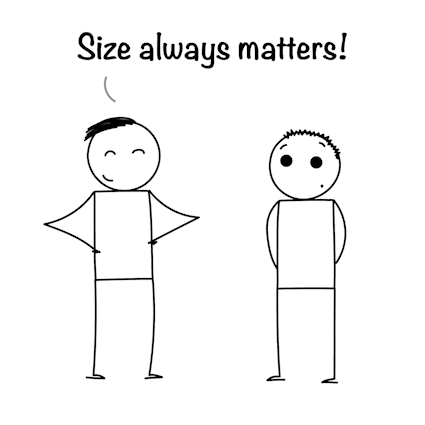
COLLABORATING IN ODIN
Size matters when you’re talking about the size of research projects.
INDUSTRY SEES ADVANTAGES OF SMALL PROJECTS
“Bigger projects are not necessarily better just because they’re big” says one of our industrial board members.
In this sense, small projects with only a handful of partners means they are small enough for everyone to talk to everyone.
But why is small sometimes best?
Here are three reasons according to the board member:
- LIGHT AND UNBURDENED: Small projects are light – it keeps things unburdened. Bigger projects are more complex and require more coordination
- SIZE AND IMPACT DOES NOT ALWAYS CORRELATE: There is not necessarily a correlation between large projects and large impact
- LOWER HURDLES: Small projects are quick and agile – and hurdles are low.
ACADEMICS PREFER ODIN PROJECTS
Some of the academic participants in ODIN explicitly state how they sometimes prefer the small ODIN projects over overly large consortia:
“Basically, everyone did their own little thing [in a big consortium], on their own. It seemed like it was just an array of small projects by each research lab. There was some collaboration between the groups of course, and there was some goal of having transferred knowledge between them. But definitely, with the ODIN project, this is a much closer collaboration between the groups that are involved. I think this is more how I want a collaboration to be with industrial partners.”
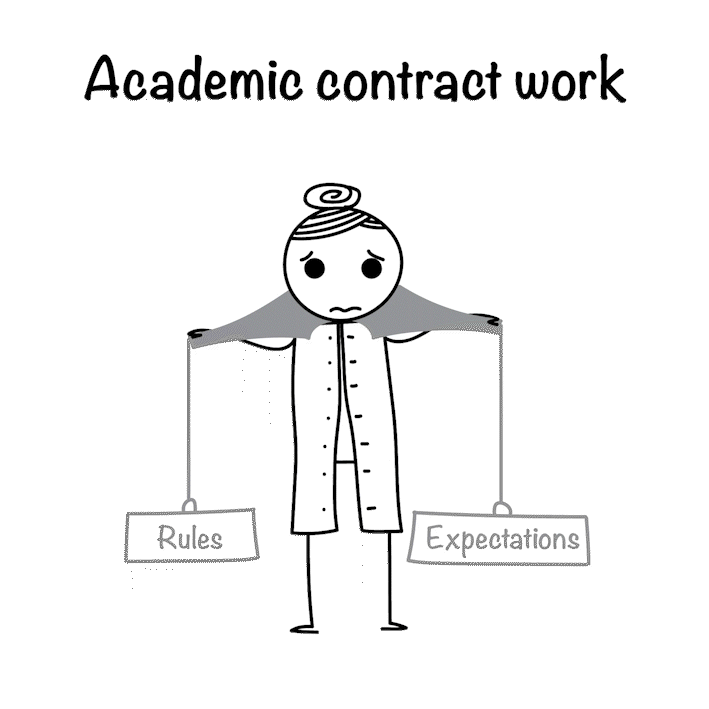
ODIN FROM AN ACADEMIC PERSPECTIVE
Working with industry doesn’t have to be at the cost of your academic freedom.
This is one of the key points from our grant holders. Here’s what they say:
THEY HAVE ACADEMIC FREEDOM
Academic participants in ODIN highlight many advantages of the small ODIN projects, where they combine their insatiable scientific curiosity with close industry collaboration. Academic freedom is the keyword:
“ODIN projects do not compromise your basic research DNA. For us, working in closed projects, with contracts and confidentiality agreements and IP rights and all that, is not always very rewarding. It places so many controls over what you do as a researcher that you lose a part of what drives you in your work: the academic freedom.” says one of the academic participants.
THERE’S NO DEMAND FOR A CERTAIN END-PRODUCT
Academic freedom also means that you might want to slightly change focus and follow a new and promising path. We think that’s what basic science is all about.
Some grant holders point out the importance of not having to deliver a specific end product. They believe it matters where the money comes from:
“It matters a lot where the money comes from. Because if the company has to pay, they usually don’t want the openness and they may feel that they are paying for a product. This leads to projects that can be quite rigid. It typically ends up with some form of contract research, where you basically decided from the start what you’re going to do” says another academic participant
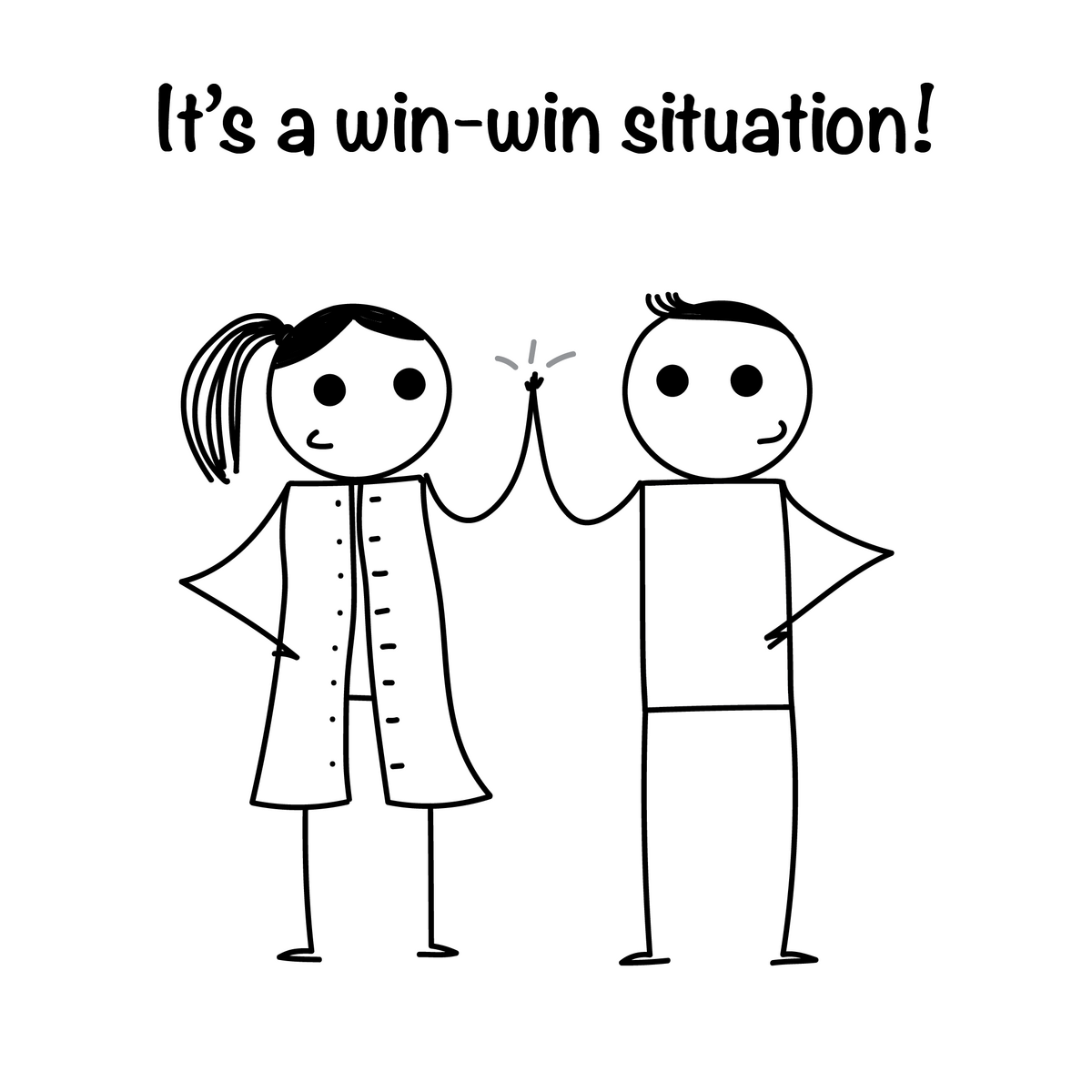
A WIN-WIN SITUATION
“It’s kind of a win-win for everybody”.
Both academic and industrial participants think that everyone will benefit from the open collaborations in ODIN.
And it’s not just something we believe. It’s written in black on white in our assessment. Several interviewees from both academia and industry emphasize how they think the project outcomes are valuable for everyone.
OPEN-ENDED ACADEMIC PROJECTS WITH A FOCUS ON INDUSTRY
Another thing that the interviewees agree on is the intrinsic nature of the ODIN projects:
“You could say that what’s special about the ODIN projects is that they’re pretty open in their aims, often rather descriptive… the unique combination of having firms in the mix, at the same time as having very open and not very precise aims, is what sets ODIN apart.” says one of our academic participants.
“We need the sum of many bright minds for this to succeed. For that we need an open platform, and there just hasn’t been a platform for this before ODIN, at least not one that I am familiar with.” adds another participant.

OPENNESS SPEEDS UP THE PROCESS
All scientists are patient. At least to some degree.
But sometimes, it would be nice to speed things up a bit.
That’s what we do in ODIN.
WE’RE ACCELERATING RESEARCH AND DISCOVERIES
All hands on deck: When more people collaborate and share openly, things are bound to accelerate!
As one of our academic participants explains:
”I think we would have ended up at the same point […]. But it would probably take several more years to do […] With ODIN, there is a specific focus on accelerating that research.”
In ODIN, we are proud to provide an opportunity for industry and academia to pursue smaller projects that both parties would find difficult to fund. But we don’t spend all our time funding projects.
ODIN is also a network trying to promote an approach known as #OpenInnovationInScience. This approach aims to boost innovation by sharing scientific results openly with everyone.
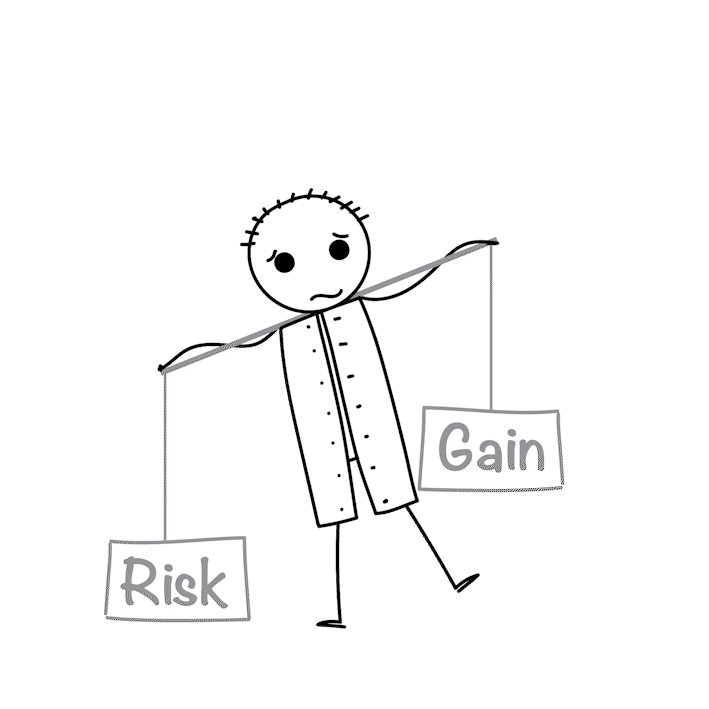
HIGH RISK AND HIGH GAIN
Sharing the risk to chase more gain:
WE’RE FUNDING HIGH-RISK, HIGH-GAIN PROJECTS
But our set-up reduces the risk for all participants.
When projects have a higher than usual risk of failure, many companies can’t invest time and money in them. But if a successful outcome of the project (the projects’ gain) is really big, it might be worth funding anyway. These projects are known as high-risk, high-gain projects.
Quite a few of our ODIN projects are high-risk high-gain. Industrial participants explain that companies would not have invested in these projects if it weren’t for ODIN:
“ […] that’s why it’s nice that ODIN is willing to invest in these projects because I think it’s highly unlikely, at least where our company is now, that we would invest 4-5 million in a high-risk, high-gain project” says one of our industry participants.
This participant further explains, how the company would not be able to start a similar project on their own:
“We need the sum of many bright minds for this to succeed. For that we need an open platform, and there just hasn’t been a platform for this before ODIN, at least not one that I am familiar with.”
One of our industrial board members elaborates on this:
”Due to the risk balance, it makes a lot of sense to support this together. […] It’s simply such a high risk, and such a hard problem, that no single party will solve it on their own. So it makes sense that a lot of companies join together in research. […] These platforms, we would never try to get IP on anyway.”

OPENNESS IS NECESSARY
The world has changed and openness is no longer a threat. It’s an opportunity to share knowledge and collaborate even among large pharma companies.
A NEW OPEN MINDSET
Earlier, many companies kept their cards close to their chests, but now the mindset is different:
“I think that if you had asked me to join ODIN 5-10 years ago, then you would probably not have met the same mindset. But an internal revolution has happened in our company, and it’s reflected [in the ODIN initiative]. It’s based on the idea that we have to think differently. […] We just have to acknowledge that the world has changed, and we have to be more open.” says one of our industry participants.
OPENNESS IS A NECESSARY CHANGE
The pharmaceutical R&D industry faces new challenges that make openness necessary at the precompetitive stage:
- Increased complexity
- Decreased productivity
- High failure rates when the drugs come to clinical trials
All of this means higher costs for developing new drugs. And that’s why openness is a necessary change. By facing the early challenges together, the companies can support each other and minimize costs.
As one of our industrial board members explains:
”Due to the risk balance, it makes a lot of sense to support this together. […] It’s simply such a high risk, and such a hard problem, that no single party will solve it on their own. So it makes sense that a lot of companies join together in research. […] These platforms, we would never try to get IP on anyway.”

THE RECIPE OF OPENNESS
“What does ODIN have to do with cake recipes?” you might ask.
Here's the answer: When you’re making a cake, you need a recipe. When you’re doing research, you need a protocol.
But even with the most detailed recipe it can be almost impossible to replicate a very complicated cake. And it’s exactly the same in research: Sometimes you need more knowledge than the actual steps. You need practice and you’d often also need ‘extra’ information. That’s what we call ‘tacit’ knowledge.
OPENNESS REQUIRES MORE EFFORT
Open principles in research are not new. So, most of our participants have some experience with openness. Still, it can be difficult to know what information to include when you share data and findings from research projects openly:
”Even though data is lying out there, it can sometimes be difficult to handle. Because you don’t have insight into how they were made. You’re supposed to write this down, to document it, but it’s still difficult… It’s like if someone has a recipe for a really complicated cake. The person who really knows how to make it is the person who created it. It can be difficult for others to replicate.” says one of our academic participants.
LET’S PRACTICE OPENNESS
Practice makes perfect, right? And everyone in ODIN is still practicing how to best apply the principles of openness to their projects. We’ll do all we can to share all data and findings and also include enough information for everyone else to find the data useful. An academic participant explains how the open data can help strengthen research results:
“For instance, a reviewer might ask you to compare open data sets to your own data, and to check if you find the same thing in other data that you found in your own. So, it can also be used as an extra validation.”
In ODIN, we think this is a very valuable use of open data. We are happy to be part of the movement towards more open data.
ABOUT ODIN
We unite bright minds from industry and academia to jointly create need-driven clinical research projects - and pave the way for innovative new treatments and diagnostics. We fund the best project ideas through competitive funding calls. Although companies cannot receive funding, it is free of charge to join.
The platform is sponsored by the Novo Nordisk Foundation with 180 million DKK from 2024-2029.
CONTACT ODIN
You are welcome to contact us if you have questions or comments. Reach out to odin@au.dk or find the Secretariat's direct email addresses under contacts.
Although the platform spans five Danish universities, we're based in Aarhus. Our office is located at Aarhus University, Ny Munkegade 120, blg 1521-214.

